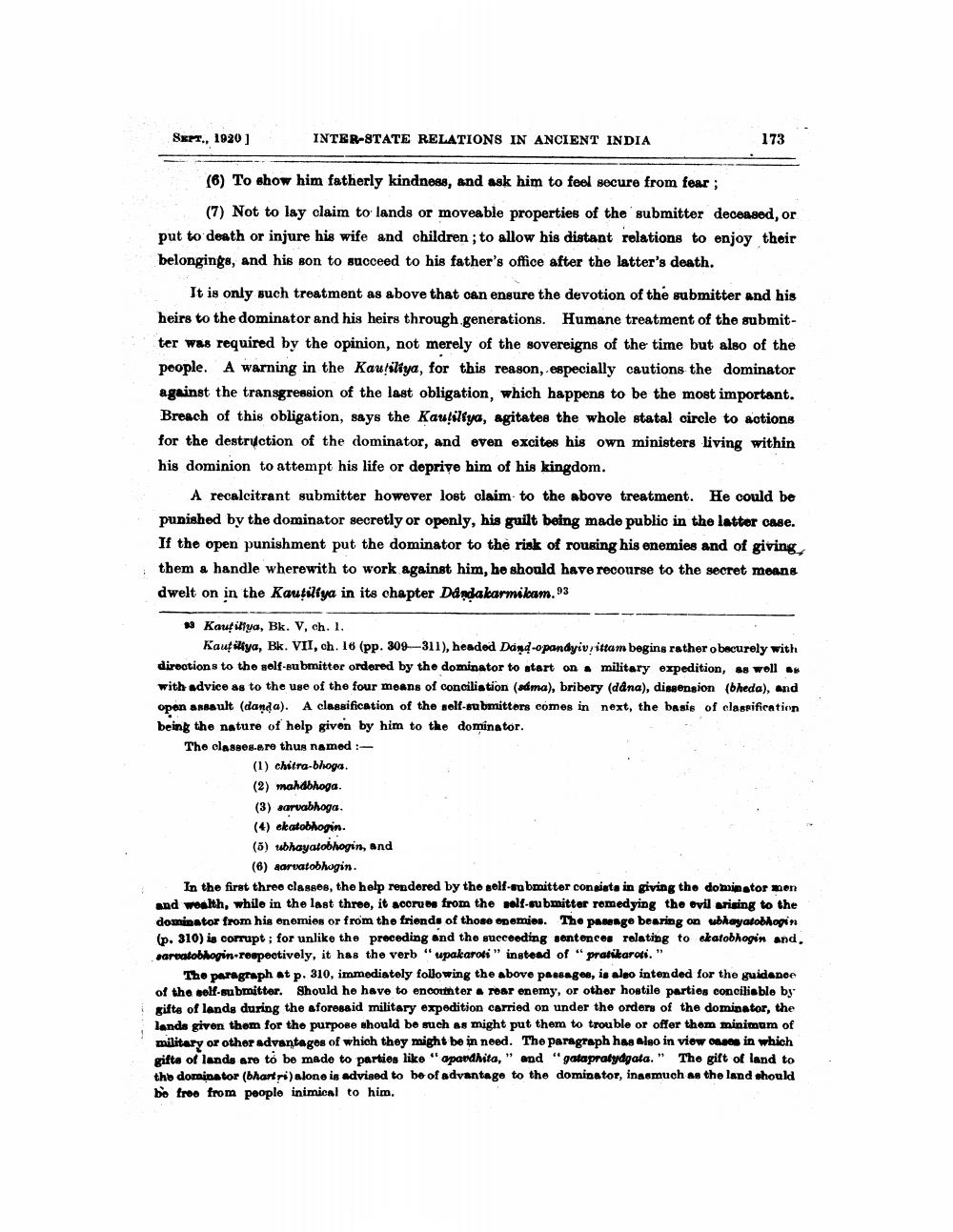________________
Sxrr., 1920]
INTER-STATE RELATIONS IN ANCIENT INDIA
173
(6) To show him fatherly kindness, and ask him to feel secure from fear;
(7) Not to lay claim to lands or moveable properties of the submitter deceased, or put to death or injure his wife and children; to allow his distant relations to enjoy their belongings, and his son to succeed to his father's office after the latter's death.
It is only such treatment as above that can ensure the devotion of the submitter and his heirs to the dominator and his heirs through generations. Humane treatment of the submitter was required by the opinion, not merely of the sovereigns of the time but also of the people. A warning in the Kauliliya, for this reason, especially cautions the dominator against the transgression of the last obligation, which happens to be the most important. Breach of this obligation, says the Kautiliya, agitates the whole statal circle to actions for the destruction of the dominator, and even excites his own ministers living within his dominion to attempt his life or deprive him of his kingdom.
A recalcitrant submitter however lost claim to the above treatment. He could be punished by the dominator secretly or openly, his guilt being made public in the latter case. If the open punishment put the dominator to the risk of rousing his enemies and of giving them a handle wherewith to work against him, he should have recourse to the secret means dwelt on in the Kautiliya in its chapter Dandakarmilam.93
1 Kautilya, Bk. V, ch. 1.
Kautilya, Bk. VII, ch. 16 (pp. 309.-311), headed Dand-opandyiv/ittam beging rather o becurely with directions to the self-submitter ordered by the dominator to start on military expedition, as well as with advice as to the use of the four means of conciliation (adma), bribery (dana), dispension (bheda), and open ansault (danda). A classification of the self-submitters comes in next, the basis of classification being the nature of help given by him to the dominator. The classes-ere thus named :
(1) chitra-bhoga. (2) mahabhoga. (3) sarvabhoga. (4) ekatobhogin. (6) wbhayatobhogin, and
(6) Aarvatobhogin. In the first three classes, the help rendered by the self-submitter consists in giving the dominator men and wealth, while in the last threo, it acorubs from the self-submitter romedying the evil arising to the dominator from his enemies or from the friends of those onemies. The pasage bearing on wbhayatobhopin (p. 310) is corrupt; for unlike the preceding and the succeeding sentences relating to ekatobhogin and sarvatobhogin-rospectively, it has the verb " upakaroti" instead of "pratikaroti."
The paragraph at p. 310, immediately following the above passages, is also intended for the guidance of the self-submitter. Should he have to encounter & rear enemy, or other hostile parties conciliable by gifts of lands during the aforesaid military expedition carried on under the orders of the dominator, the lands given them for the purpose should be such as might put them to trouble or offer thom minimum of military or other advantages of which they might be in need. The paragraph has also in viow won in which gifta of lands are to be made to parties like " apardhita," and "gatapratydgata." The gift of land to thb dominator (bhartri) alone is advised to be of advantage to the dominator, inasmuch as the land should be froo from people inimical to him.




